Analysis and Improvement of Oil Pollution Legislation in Nigeria
VerifiedAdded on 2023/01/18
|9
|4567
|70
Thesis and Dissertation
AI Summary
This dissertation provides an in-depth analysis of Nigeria's oil pollution legislation, particularly concerning the Niger Delta region, where oil exploration has led to significant environmental damage. It highlights the shortcomings of the 1969 Petroleum Act and subsequent intervention efforts. The work examines the legal and regulatory frameworks governing oil spills, assessing their effectiveness and identifying loopholes. It also evaluates the implementation of the polluter-pays principle, funding for environmental remediation, and the impact of the Petroleum Industry Act (PIA) 2021. The study further explores the environmental, agricultural, and health consequences of oil spills, the roles of government and other organizations in managing oil activities, and the relevance of climate change laws. Ultimately, the dissertation aims to contribute to the development of more effective legal systems for addressing oil pollution in Nigeria.
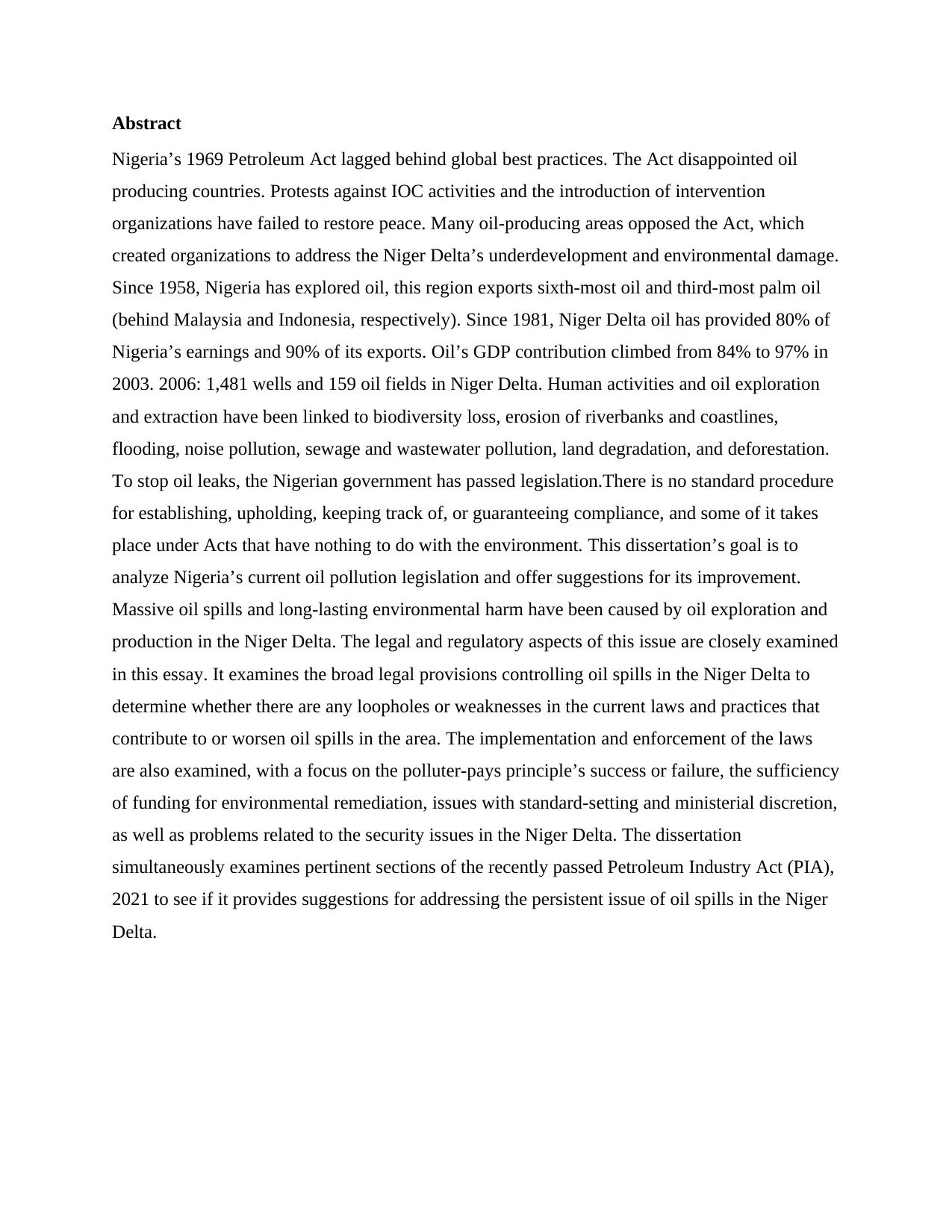
Abstract
Nigeria’s 1969 Petroleum Act lagged behind global best practices. The Act disappointed oil
producing countries. Protests against IOC activities and the introduction of intervention
organizations have failed to restore peace. Many oil-producing areas opposed the Act, which
created organizations to address the Niger Delta’s underdevelopment and environmental damage.
Since 1958, Nigeria has explored oil, this region exports sixth-most oil and third-most palm oil
(behind Malaysia and Indonesia, respectively). Since 1981, Niger Delta oil has provided 80% of
Nigeria’s earnings and 90% of its exports. Oil’s GDP contribution climbed from 84% to 97% in
2003. 2006: 1,481 wells and 159 oil fields in Niger Delta. Human activities and oil exploration
and extraction have been linked to biodiversity loss, erosion of riverbanks and coastlines,
flooding, noise pollution, sewage and wastewater pollution, land degradation, and deforestation.
To stop oil leaks, the Nigerian government has passed legislation.There is no standard procedure
for establishing, upholding, keeping track of, or guaranteeing compliance, and some of it takes
place under Acts that have nothing to do with the environment. This dissertation’s goal is to
analyze Nigeria’s current oil pollution legislation and offer suggestions for its improvement.
Massive oil spills and long-lasting environmental harm have been caused by oil exploration and
production in the Niger Delta. The legal and regulatory aspects of this issue are closely examined
in this essay. It examines the broad legal provisions controlling oil spills in the Niger Delta to
determine whether there are any loopholes or weaknesses in the current laws and practices that
contribute to or worsen oil spills in the area. The implementation and enforcement of the laws
are also examined, with a focus on the polluter-pays principle’s success or failure, the sufficiency
of funding for environmental remediation, issues with standard-setting and ministerial discretion,
as well as problems related to the security issues in the Niger Delta. The dissertation
simultaneously examines pertinent sections of the recently passed Petroleum Industry Act (PIA),
2021 to see if it provides suggestions for addressing the persistent issue of oil spills in the Niger
Delta.
Nigeria’s 1969 Petroleum Act lagged behind global best practices. The Act disappointed oil
producing countries. Protests against IOC activities and the introduction of intervention
organizations have failed to restore peace. Many oil-producing areas opposed the Act, which
created organizations to address the Niger Delta’s underdevelopment and environmental damage.
Since 1958, Nigeria has explored oil, this region exports sixth-most oil and third-most palm oil
(behind Malaysia and Indonesia, respectively). Since 1981, Niger Delta oil has provided 80% of
Nigeria’s earnings and 90% of its exports. Oil’s GDP contribution climbed from 84% to 97% in
2003. 2006: 1,481 wells and 159 oil fields in Niger Delta. Human activities and oil exploration
and extraction have been linked to biodiversity loss, erosion of riverbanks and coastlines,
flooding, noise pollution, sewage and wastewater pollution, land degradation, and deforestation.
To stop oil leaks, the Nigerian government has passed legislation.There is no standard procedure
for establishing, upholding, keeping track of, or guaranteeing compliance, and some of it takes
place under Acts that have nothing to do with the environment. This dissertation’s goal is to
analyze Nigeria’s current oil pollution legislation and offer suggestions for its improvement.
Massive oil spills and long-lasting environmental harm have been caused by oil exploration and
production in the Niger Delta. The legal and regulatory aspects of this issue are closely examined
in this essay. It examines the broad legal provisions controlling oil spills in the Niger Delta to
determine whether there are any loopholes or weaknesses in the current laws and practices that
contribute to or worsen oil spills in the area. The implementation and enforcement of the laws
are also examined, with a focus on the polluter-pays principle’s success or failure, the sufficiency
of funding for environmental remediation, issues with standard-setting and ministerial discretion,
as well as problems related to the security issues in the Niger Delta. The dissertation
simultaneously examines pertinent sections of the recently passed Petroleum Industry Act (PIA),
2021 to see if it provides suggestions for addressing the persistent issue of oil spills in the Niger
Delta.
Paraphrase This Document
Need a fresh take? Get an instant paraphrase of this document with our AI Paraphraser
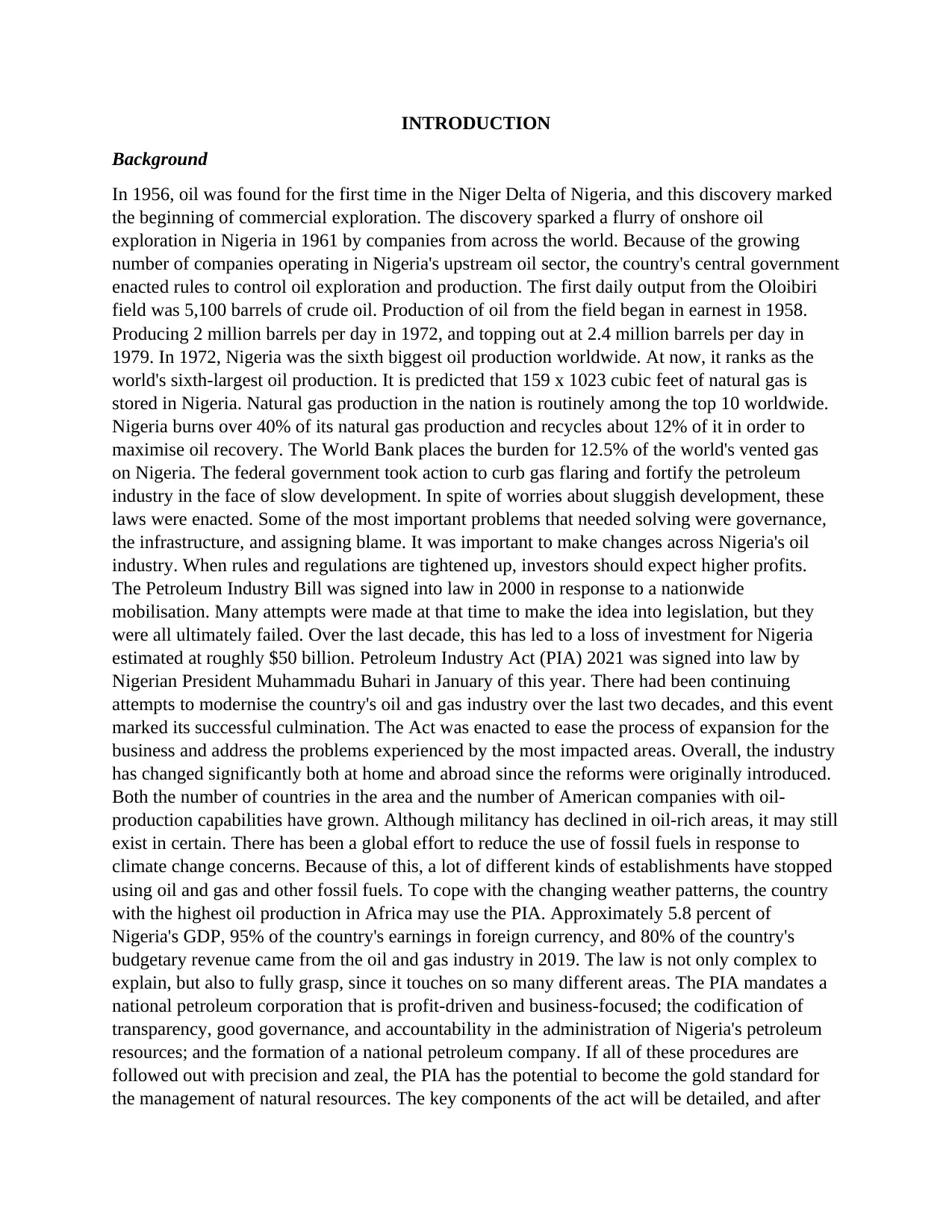
INTRODUCTION
Background
In 1956, oil was found for the first time in the Niger Delta of Nigeria, and this discovery marked
the beginning of commercial exploration. The discovery sparked a flurry of onshore oil
exploration in Nigeria in 1961 by companies from across the world. Because of the growing
number of companies operating in Nigeria's upstream oil sector, the country's central government
enacted rules to control oil exploration and production. The first daily output from the Oloibiri
field was 5,100 barrels of crude oil. Production of oil from the field began in earnest in 1958.
Producing 2 million barrels per day in 1972, and topping out at 2.4 million barrels per day in
1979. In 1972, Nigeria was the sixth biggest oil production worldwide. At now, it ranks as the
world's sixth-largest oil production. It is predicted that 159 x 1023 cubic feet of natural gas is
stored in Nigeria. Natural gas production in the nation is routinely among the top 10 worldwide.
Nigeria burns over 40% of its natural gas production and recycles about 12% of it in order to
maximise oil recovery. The World Bank places the burden for 12.5% of the world's vented gas
on Nigeria. The federal government took action to curb gas flaring and fortify the petroleum
industry in the face of slow development. In spite of worries about sluggish development, these
laws were enacted. Some of the most important problems that needed solving were governance,
the infrastructure, and assigning blame. It was important to make changes across Nigeria's oil
industry. When rules and regulations are tightened up, investors should expect higher profits.
The Petroleum Industry Bill was signed into law in 2000 in response to a nationwide
mobilisation. Many attempts were made at that time to make the idea into legislation, but they
were all ultimately failed. Over the last decade, this has led to a loss of investment for Nigeria
estimated at roughly $50 billion. Petroleum Industry Act (PIA) 2021 was signed into law by
Nigerian President Muhammadu Buhari in January of this year. There had been continuing
attempts to modernise the country's oil and gas industry over the last two decades, and this event
marked its successful culmination. The Act was enacted to ease the process of expansion for the
business and address the problems experienced by the most impacted areas. Overall, the industry
has changed significantly both at home and abroad since the reforms were originally introduced.
Both the number of countries in the area and the number of American companies with oil-
production capabilities have grown. Although militancy has declined in oil-rich areas, it may still
exist in certain. There has been a global effort to reduce the use of fossil fuels in response to
climate change concerns. Because of this, a lot of different kinds of establishments have stopped
using oil and gas and other fossil fuels. To cope with the changing weather patterns, the country
with the highest oil production in Africa may use the PIA. Approximately 5.8 percent of
Nigeria's GDP, 95% of the country's earnings in foreign currency, and 80% of the country's
budgetary revenue came from the oil and gas industry in 2019. The law is not only complex to
explain, but also to fully grasp, since it touches on so many different areas. The PIA mandates a
national petroleum corporation that is profit-driven and business-focused; the codification of
transparency, good governance, and accountability in the administration of Nigeria's petroleum
resources; and the formation of a national petroleum company. If all of these procedures are
followed out with precision and zeal, the PIA has the potential to become the gold standard for
the management of natural resources. The key components of the act will be detailed, and after
Background
In 1956, oil was found for the first time in the Niger Delta of Nigeria, and this discovery marked
the beginning of commercial exploration. The discovery sparked a flurry of onshore oil
exploration in Nigeria in 1961 by companies from across the world. Because of the growing
number of companies operating in Nigeria's upstream oil sector, the country's central government
enacted rules to control oil exploration and production. The first daily output from the Oloibiri
field was 5,100 barrels of crude oil. Production of oil from the field began in earnest in 1958.
Producing 2 million barrels per day in 1972, and topping out at 2.4 million barrels per day in
1979. In 1972, Nigeria was the sixth biggest oil production worldwide. At now, it ranks as the
world's sixth-largest oil production. It is predicted that 159 x 1023 cubic feet of natural gas is
stored in Nigeria. Natural gas production in the nation is routinely among the top 10 worldwide.
Nigeria burns over 40% of its natural gas production and recycles about 12% of it in order to
maximise oil recovery. The World Bank places the burden for 12.5% of the world's vented gas
on Nigeria. The federal government took action to curb gas flaring and fortify the petroleum
industry in the face of slow development. In spite of worries about sluggish development, these
laws were enacted. Some of the most important problems that needed solving were governance,
the infrastructure, and assigning blame. It was important to make changes across Nigeria's oil
industry. When rules and regulations are tightened up, investors should expect higher profits.
The Petroleum Industry Bill was signed into law in 2000 in response to a nationwide
mobilisation. Many attempts were made at that time to make the idea into legislation, but they
were all ultimately failed. Over the last decade, this has led to a loss of investment for Nigeria
estimated at roughly $50 billion. Petroleum Industry Act (PIA) 2021 was signed into law by
Nigerian President Muhammadu Buhari in January of this year. There had been continuing
attempts to modernise the country's oil and gas industry over the last two decades, and this event
marked its successful culmination. The Act was enacted to ease the process of expansion for the
business and address the problems experienced by the most impacted areas. Overall, the industry
has changed significantly both at home and abroad since the reforms were originally introduced.
Both the number of countries in the area and the number of American companies with oil-
production capabilities have grown. Although militancy has declined in oil-rich areas, it may still
exist in certain. There has been a global effort to reduce the use of fossil fuels in response to
climate change concerns. Because of this, a lot of different kinds of establishments have stopped
using oil and gas and other fossil fuels. To cope with the changing weather patterns, the country
with the highest oil production in Africa may use the PIA. Approximately 5.8 percent of
Nigeria's GDP, 95% of the country's earnings in foreign currency, and 80% of the country's
budgetary revenue came from the oil and gas industry in 2019. The law is not only complex to
explain, but also to fully grasp, since it touches on so many different areas. The PIA mandates a
national petroleum corporation that is profit-driven and business-focused; the codification of
transparency, good governance, and accountability in the administration of Nigeria's petroleum
resources; and the formation of a national petroleum company. If all of these procedures are
followed out with precision and zeal, the PIA has the potential to become the gold standard for
the management of natural resources. The key components of the act will be detailed, and after
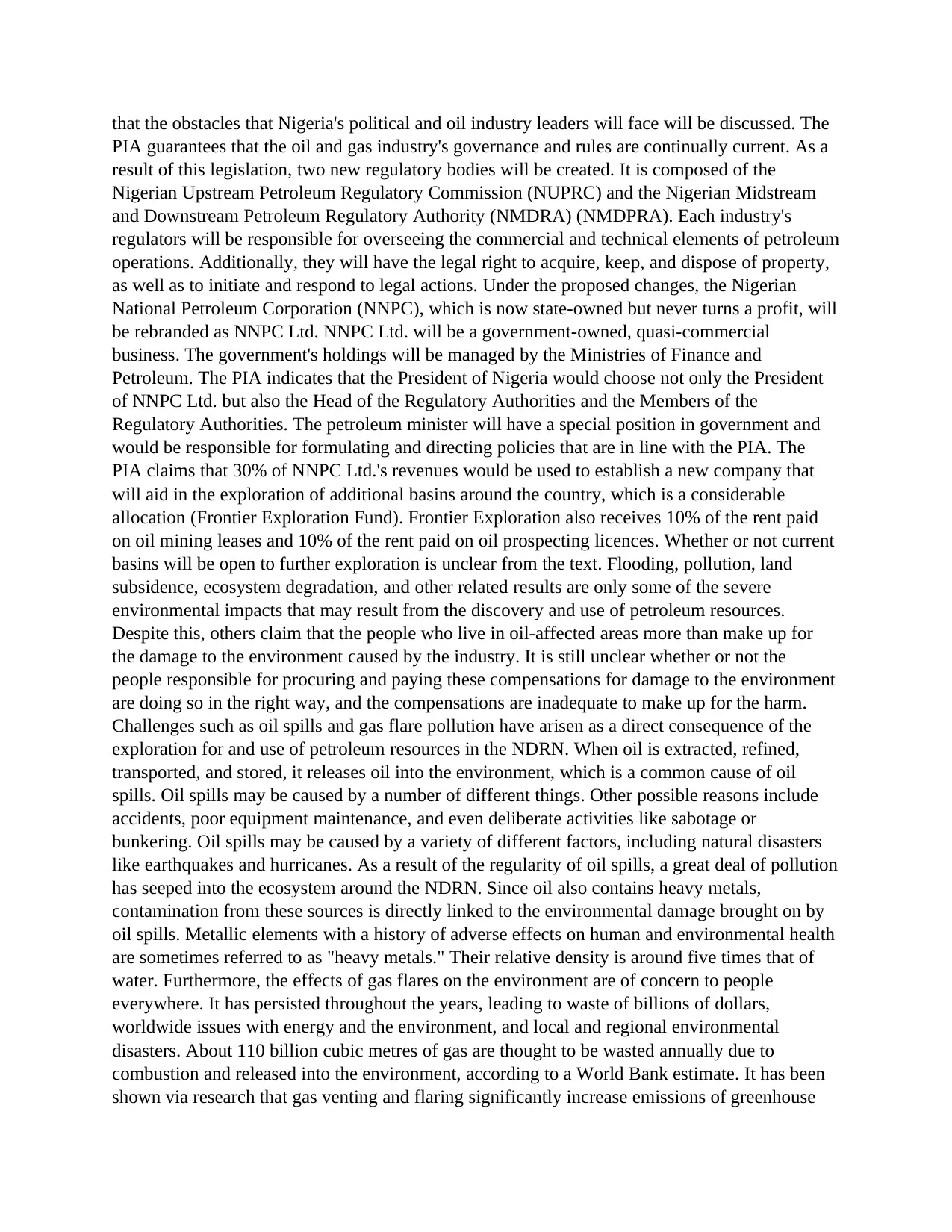
that the obstacles that Nigeria's political and oil industry leaders will face will be discussed. The
PIA guarantees that the oil and gas industry's governance and rules are continually current. As a
result of this legislation, two new regulatory bodies will be created. It is composed of the
Nigerian Upstream Petroleum Regulatory Commission (NUPRC) and the Nigerian Midstream
and Downstream Petroleum Regulatory Authority (NMDRA) (NMDPRA). Each industry's
regulators will be responsible for overseeing the commercial and technical elements of petroleum
operations. Additionally, they will have the legal right to acquire, keep, and dispose of property,
as well as to initiate and respond to legal actions. Under the proposed changes, the Nigerian
National Petroleum Corporation (NNPC), which is now state-owned but never turns a profit, will
be rebranded as NNPC Ltd. NNPC Ltd. will be a government-owned, quasi-commercial
business. The government's holdings will be managed by the Ministries of Finance and
Petroleum. The PIA indicates that the President of Nigeria would choose not only the President
of NNPC Ltd. but also the Head of the Regulatory Authorities and the Members of the
Regulatory Authorities. The petroleum minister will have a special position in government and
would be responsible for formulating and directing policies that are in line with the PIA. The
PIA claims that 30% of NNPC Ltd.'s revenues would be used to establish a new company that
will aid in the exploration of additional basins around the country, which is a considerable
allocation (Frontier Exploration Fund). Frontier Exploration also receives 10% of the rent paid
on oil mining leases and 10% of the rent paid on oil prospecting licences. Whether or not current
basins will be open to further exploration is unclear from the text. Flooding, pollution, land
subsidence, ecosystem degradation, and other related results are only some of the severe
environmental impacts that may result from the discovery and use of petroleum resources.
Despite this, others claim that the people who live in oil-affected areas more than make up for
the damage to the environment caused by the industry. It is still unclear whether or not the
people responsible for procuring and paying these compensations for damage to the environment
are doing so in the right way, and the compensations are inadequate to make up for the harm.
Challenges such as oil spills and gas flare pollution have arisen as a direct consequence of the
exploration for and use of petroleum resources in the NDRN. When oil is extracted, refined,
transported, and stored, it releases oil into the environment, which is a common cause of oil
spills. Oil spills may be caused by a number of different things. Other possible reasons include
accidents, poor equipment maintenance, and even deliberate activities like sabotage or
bunkering. Oil spills may be caused by a variety of different factors, including natural disasters
like earthquakes and hurricanes. As a result of the regularity of oil spills, a great deal of pollution
has seeped into the ecosystem around the NDRN. Since oil also contains heavy metals,
contamination from these sources is directly linked to the environmental damage brought on by
oil spills. Metallic elements with a history of adverse effects on human and environmental health
are sometimes referred to as "heavy metals." Their relative density is around five times that of
water. Furthermore, the effects of gas flares on the environment are of concern to people
everywhere. It has persisted throughout the years, leading to waste of billions of dollars,
worldwide issues with energy and the environment, and local and regional environmental
disasters. About 110 billion cubic metres of gas are thought to be wasted annually due to
combustion and released into the environment, according to a World Bank estimate. It has been
shown via research that gas venting and flaring significantly increase emissions of greenhouse
PIA guarantees that the oil and gas industry's governance and rules are continually current. As a
result of this legislation, two new regulatory bodies will be created. It is composed of the
Nigerian Upstream Petroleum Regulatory Commission (NUPRC) and the Nigerian Midstream
and Downstream Petroleum Regulatory Authority (NMDRA) (NMDPRA). Each industry's
regulators will be responsible for overseeing the commercial and technical elements of petroleum
operations. Additionally, they will have the legal right to acquire, keep, and dispose of property,
as well as to initiate and respond to legal actions. Under the proposed changes, the Nigerian
National Petroleum Corporation (NNPC), which is now state-owned but never turns a profit, will
be rebranded as NNPC Ltd. NNPC Ltd. will be a government-owned, quasi-commercial
business. The government's holdings will be managed by the Ministries of Finance and
Petroleum. The PIA indicates that the President of Nigeria would choose not only the President
of NNPC Ltd. but also the Head of the Regulatory Authorities and the Members of the
Regulatory Authorities. The petroleum minister will have a special position in government and
would be responsible for formulating and directing policies that are in line with the PIA. The
PIA claims that 30% of NNPC Ltd.'s revenues would be used to establish a new company that
will aid in the exploration of additional basins around the country, which is a considerable
allocation (Frontier Exploration Fund). Frontier Exploration also receives 10% of the rent paid
on oil mining leases and 10% of the rent paid on oil prospecting licences. Whether or not current
basins will be open to further exploration is unclear from the text. Flooding, pollution, land
subsidence, ecosystem degradation, and other related results are only some of the severe
environmental impacts that may result from the discovery and use of petroleum resources.
Despite this, others claim that the people who live in oil-affected areas more than make up for
the damage to the environment caused by the industry. It is still unclear whether or not the
people responsible for procuring and paying these compensations for damage to the environment
are doing so in the right way, and the compensations are inadequate to make up for the harm.
Challenges such as oil spills and gas flare pollution have arisen as a direct consequence of the
exploration for and use of petroleum resources in the NDRN. When oil is extracted, refined,
transported, and stored, it releases oil into the environment, which is a common cause of oil
spills. Oil spills may be caused by a number of different things. Other possible reasons include
accidents, poor equipment maintenance, and even deliberate activities like sabotage or
bunkering. Oil spills may be caused by a variety of different factors, including natural disasters
like earthquakes and hurricanes. As a result of the regularity of oil spills, a great deal of pollution
has seeped into the ecosystem around the NDRN. Since oil also contains heavy metals,
contamination from these sources is directly linked to the environmental damage brought on by
oil spills. Metallic elements with a history of adverse effects on human and environmental health
are sometimes referred to as "heavy metals." Their relative density is around five times that of
water. Furthermore, the effects of gas flares on the environment are of concern to people
everywhere. It has persisted throughout the years, leading to waste of billions of dollars,
worldwide issues with energy and the environment, and local and regional environmental
disasters. About 110 billion cubic metres of gas are thought to be wasted annually due to
combustion and released into the environment, according to a World Bank estimate. It has been
shown via research that gas venting and flaring significantly increase emissions of greenhouse
⊘ This is a preview!⊘
Do you want full access?
Subscribe today to unlock all pages.

Trusted by 1+ million students worldwide
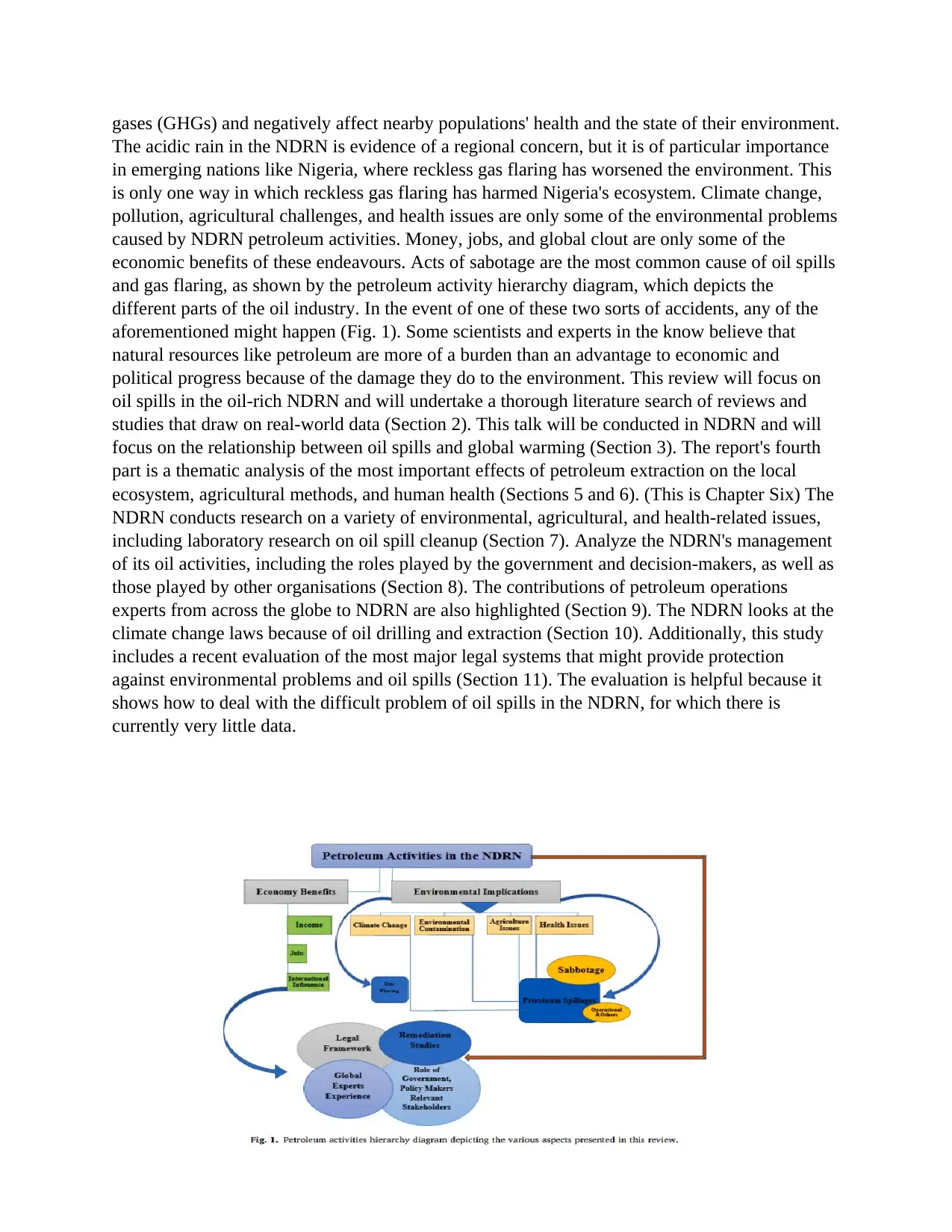
gases (GHGs) and negatively affect nearby populations' health and the state of their environment.
The acidic rain in the NDRN is evidence of a regional concern, but it is of particular importance
in emerging nations like Nigeria, where reckless gas flaring has worsened the environment. This
is only one way in which reckless gas flaring has harmed Nigeria's ecosystem. Climate change,
pollution, agricultural challenges, and health issues are only some of the environmental problems
caused by NDRN petroleum activities. Money, jobs, and global clout are only some of the
economic benefits of these endeavours. Acts of sabotage are the most common cause of oil spills
and gas flaring, as shown by the petroleum activity hierarchy diagram, which depicts the
different parts of the oil industry. In the event of one of these two sorts of accidents, any of the
aforementioned might happen (Fig. 1). Some scientists and experts in the know believe that
natural resources like petroleum are more of a burden than an advantage to economic and
political progress because of the damage they do to the environment. This review will focus on
oil spills in the oil-rich NDRN and will undertake a thorough literature search of reviews and
studies that draw on real-world data (Section 2). This talk will be conducted in NDRN and will
focus on the relationship between oil spills and global warming (Section 3). The report's fourth
part is a thematic analysis of the most important effects of petroleum extraction on the local
ecosystem, agricultural methods, and human health (Sections 5 and 6). (This is Chapter Six) The
NDRN conducts research on a variety of environmental, agricultural, and health-related issues,
including laboratory research on oil spill cleanup (Section 7). Analyze the NDRN's management
of its oil activities, including the roles played by the government and decision-makers, as well as
those played by other organisations (Section 8). The contributions of petroleum operations
experts from across the globe to NDRN are also highlighted (Section 9). The NDRN looks at the
climate change laws because of oil drilling and extraction (Section 10). Additionally, this study
includes a recent evaluation of the most major legal systems that might provide protection
against environmental problems and oil spills (Section 11). The evaluation is helpful because it
shows how to deal with the difficult problem of oil spills in the NDRN, for which there is
currently very little data.
The acidic rain in the NDRN is evidence of a regional concern, but it is of particular importance
in emerging nations like Nigeria, where reckless gas flaring has worsened the environment. This
is only one way in which reckless gas flaring has harmed Nigeria's ecosystem. Climate change,
pollution, agricultural challenges, and health issues are only some of the environmental problems
caused by NDRN petroleum activities. Money, jobs, and global clout are only some of the
economic benefits of these endeavours. Acts of sabotage are the most common cause of oil spills
and gas flaring, as shown by the petroleum activity hierarchy diagram, which depicts the
different parts of the oil industry. In the event of one of these two sorts of accidents, any of the
aforementioned might happen (Fig. 1). Some scientists and experts in the know believe that
natural resources like petroleum are more of a burden than an advantage to economic and
political progress because of the damage they do to the environment. This review will focus on
oil spills in the oil-rich NDRN and will undertake a thorough literature search of reviews and
studies that draw on real-world data (Section 2). This talk will be conducted in NDRN and will
focus on the relationship between oil spills and global warming (Section 3). The report's fourth
part is a thematic analysis of the most important effects of petroleum extraction on the local
ecosystem, agricultural methods, and human health (Sections 5 and 6). (This is Chapter Six) The
NDRN conducts research on a variety of environmental, agricultural, and health-related issues,
including laboratory research on oil spill cleanup (Section 7). Analyze the NDRN's management
of its oil activities, including the roles played by the government and decision-makers, as well as
those played by other organisations (Section 8). The contributions of petroleum operations
experts from across the globe to NDRN are also highlighted (Section 9). The NDRN looks at the
climate change laws because of oil drilling and extraction (Section 10). Additionally, this study
includes a recent evaluation of the most major legal systems that might provide protection
against environmental problems and oil spills (Section 11). The evaluation is helpful because it
shows how to deal with the difficult problem of oil spills in the NDRN, for which there is
currently very little data.
Paraphrase This Document
Need a fresh take? Get an instant paraphrase of this document with our AI Paraphraser
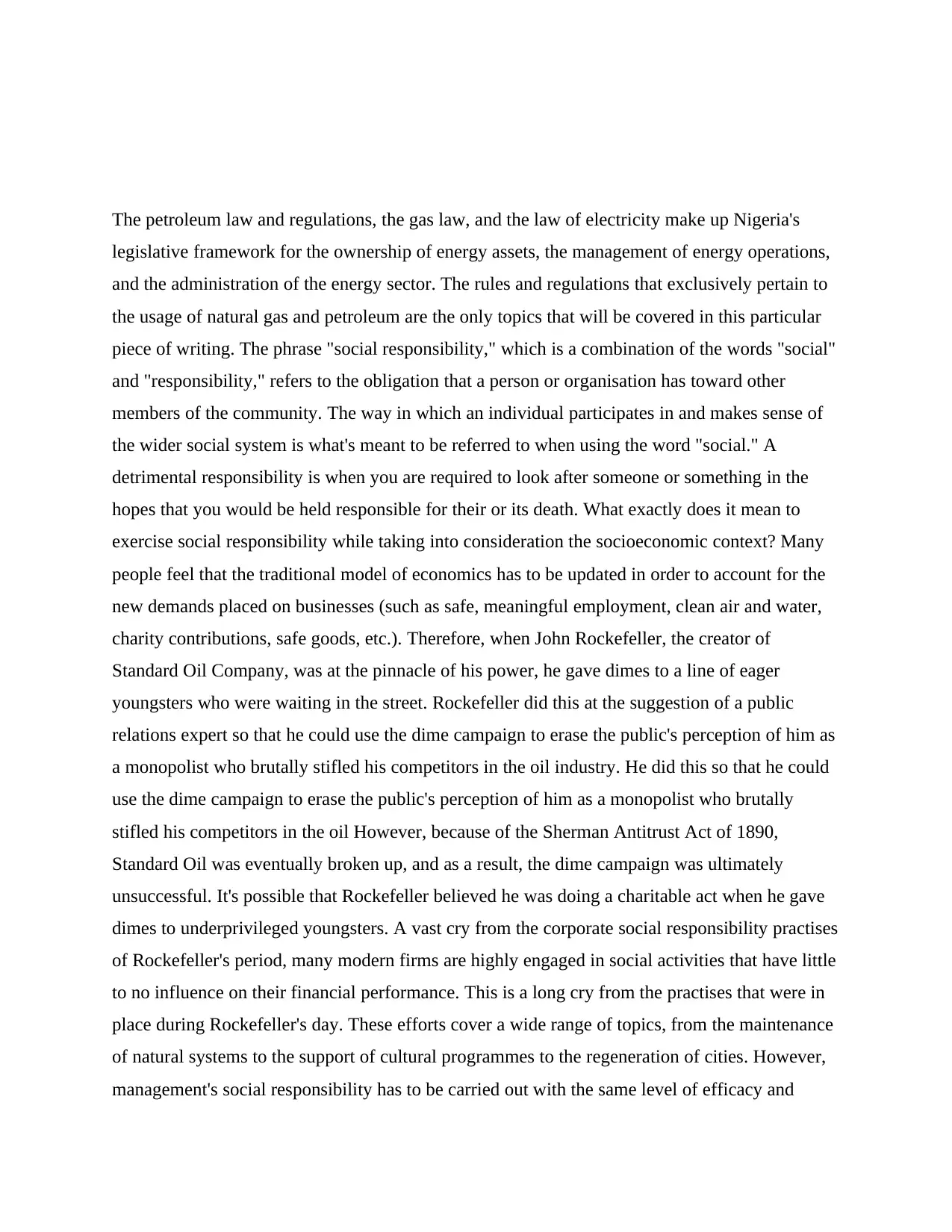
The petroleum law and regulations, the gas law, and the law of electricity make up Nigeria's
legislative framework for the ownership of energy assets, the management of energy operations,
and the administration of the energy sector. The rules and regulations that exclusively pertain to
the usage of natural gas and petroleum are the only topics that will be covered in this particular
piece of writing. The phrase "social responsibility," which is a combination of the words "social"
and "responsibility," refers to the obligation that a person or organisation has toward other
members of the community. The way in which an individual participates in and makes sense of
the wider social system is what's meant to be referred to when using the word "social." A
detrimental responsibility is when you are required to look after someone or something in the
hopes that you would be held responsible for their or its death. What exactly does it mean to
exercise social responsibility while taking into consideration the socioeconomic context? Many
people feel that the traditional model of economics has to be updated in order to account for the
new demands placed on businesses (such as safe, meaningful employment, clean air and water,
charity contributions, safe goods, etc.). Therefore, when John Rockefeller, the creator of
Standard Oil Company, was at the pinnacle of his power, he gave dimes to a line of eager
youngsters who were waiting in the street. Rockefeller did this at the suggestion of a public
relations expert so that he could use the dime campaign to erase the public's perception of him as
a monopolist who brutally stifled his competitors in the oil industry. He did this so that he could
use the dime campaign to erase the public's perception of him as a monopolist who brutally
stifled his competitors in the oil However, because of the Sherman Antitrust Act of 1890,
Standard Oil was eventually broken up, and as a result, the dime campaign was ultimately
unsuccessful. It's possible that Rockefeller believed he was doing a charitable act when he gave
dimes to underprivileged youngsters. A vast cry from the corporate social responsibility practises
of Rockefeller's period, many modern firms are highly engaged in social activities that have little
to no influence on their financial performance. This is a long cry from the practises that were in
place during Rockefeller's day. These efforts cover a wide range of topics, from the maintenance
of natural systems to the support of cultural programmes to the regeneration of cities. However,
management's social responsibility has to be carried out with the same level of efficacy and
legislative framework for the ownership of energy assets, the management of energy operations,
and the administration of the energy sector. The rules and regulations that exclusively pertain to
the usage of natural gas and petroleum are the only topics that will be covered in this particular
piece of writing. The phrase "social responsibility," which is a combination of the words "social"
and "responsibility," refers to the obligation that a person or organisation has toward other
members of the community. The way in which an individual participates in and makes sense of
the wider social system is what's meant to be referred to when using the word "social." A
detrimental responsibility is when you are required to look after someone or something in the
hopes that you would be held responsible for their or its death. What exactly does it mean to
exercise social responsibility while taking into consideration the socioeconomic context? Many
people feel that the traditional model of economics has to be updated in order to account for the
new demands placed on businesses (such as safe, meaningful employment, clean air and water,
charity contributions, safe goods, etc.). Therefore, when John Rockefeller, the creator of
Standard Oil Company, was at the pinnacle of his power, he gave dimes to a line of eager
youngsters who were waiting in the street. Rockefeller did this at the suggestion of a public
relations expert so that he could use the dime campaign to erase the public's perception of him as
a monopolist who brutally stifled his competitors in the oil industry. He did this so that he could
use the dime campaign to erase the public's perception of him as a monopolist who brutally
stifled his competitors in the oil However, because of the Sherman Antitrust Act of 1890,
Standard Oil was eventually broken up, and as a result, the dime campaign was ultimately
unsuccessful. It's possible that Rockefeller believed he was doing a charitable act when he gave
dimes to underprivileged youngsters. A vast cry from the corporate social responsibility practises
of Rockefeller's period, many modern firms are highly engaged in social activities that have little
to no influence on their financial performance. This is a long cry from the practises that were in
place during Rockefeller's day. These efforts cover a wide range of topics, from the maintenance
of natural systems to the support of cultural programmes to the regeneration of cities. However,
management's social responsibility has to be carried out with the same level of efficacy and
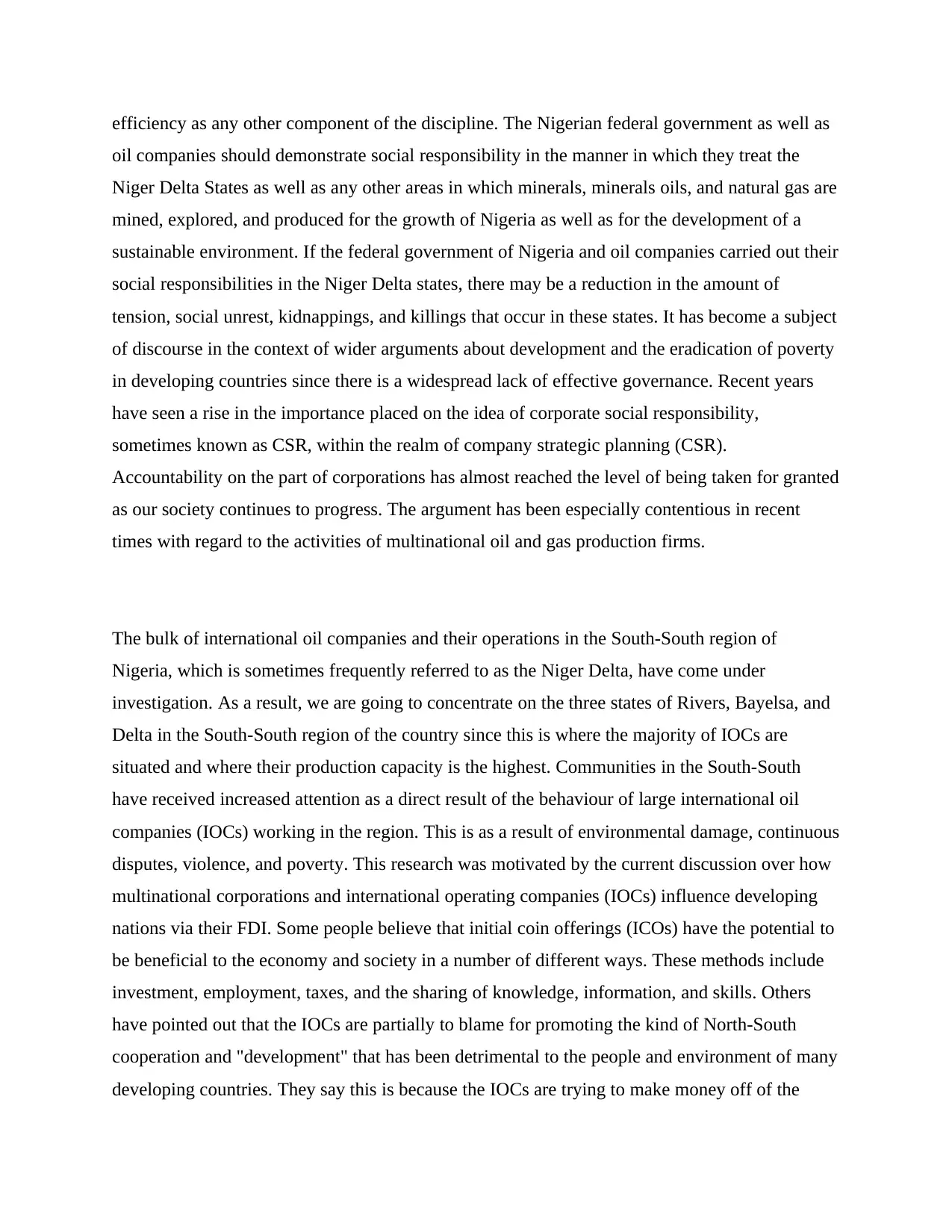
efficiency as any other component of the discipline. The Nigerian federal government as well as
oil companies should demonstrate social responsibility in the manner in which they treat the
Niger Delta States as well as any other areas in which minerals, minerals oils, and natural gas are
mined, explored, and produced for the growth of Nigeria as well as for the development of a
sustainable environment. If the federal government of Nigeria and oil companies carried out their
social responsibilities in the Niger Delta states, there may be a reduction in the amount of
tension, social unrest, kidnappings, and killings that occur in these states. It has become a subject
of discourse in the context of wider arguments about development and the eradication of poverty
in developing countries since there is a widespread lack of effective governance. Recent years
have seen a rise in the importance placed on the idea of corporate social responsibility,
sometimes known as CSR, within the realm of company strategic planning (CSR).
Accountability on the part of corporations has almost reached the level of being taken for granted
as our society continues to progress. The argument has been especially contentious in recent
times with regard to the activities of multinational oil and gas production firms.
The bulk of international oil companies and their operations in the South-South region of
Nigeria, which is sometimes frequently referred to as the Niger Delta, have come under
investigation. As a result, we are going to concentrate on the three states of Rivers, Bayelsa, and
Delta in the South-South region of the country since this is where the majority of IOCs are
situated and where their production capacity is the highest. Communities in the South-South
have received increased attention as a direct result of the behaviour of large international oil
companies (IOCs) working in the region. This is as a result of environmental damage, continuous
disputes, violence, and poverty. This research was motivated by the current discussion over how
multinational corporations and international operating companies (IOCs) influence developing
nations via their FDI. Some people believe that initial coin offerings (ICOs) have the potential to
be beneficial to the economy and society in a number of different ways. These methods include
investment, employment, taxes, and the sharing of knowledge, information, and skills. Others
have pointed out that the IOCs are partially to blame for promoting the kind of North-South
cooperation and "development" that has been detrimental to the people and environment of many
developing countries. They say this is because the IOCs are trying to make money off of the
oil companies should demonstrate social responsibility in the manner in which they treat the
Niger Delta States as well as any other areas in which minerals, minerals oils, and natural gas are
mined, explored, and produced for the growth of Nigeria as well as for the development of a
sustainable environment. If the federal government of Nigeria and oil companies carried out their
social responsibilities in the Niger Delta states, there may be a reduction in the amount of
tension, social unrest, kidnappings, and killings that occur in these states. It has become a subject
of discourse in the context of wider arguments about development and the eradication of poverty
in developing countries since there is a widespread lack of effective governance. Recent years
have seen a rise in the importance placed on the idea of corporate social responsibility,
sometimes known as CSR, within the realm of company strategic planning (CSR).
Accountability on the part of corporations has almost reached the level of being taken for granted
as our society continues to progress. The argument has been especially contentious in recent
times with regard to the activities of multinational oil and gas production firms.
The bulk of international oil companies and their operations in the South-South region of
Nigeria, which is sometimes frequently referred to as the Niger Delta, have come under
investigation. As a result, we are going to concentrate on the three states of Rivers, Bayelsa, and
Delta in the South-South region of the country since this is where the majority of IOCs are
situated and where their production capacity is the highest. Communities in the South-South
have received increased attention as a direct result of the behaviour of large international oil
companies (IOCs) working in the region. This is as a result of environmental damage, continuous
disputes, violence, and poverty. This research was motivated by the current discussion over how
multinational corporations and international operating companies (IOCs) influence developing
nations via their FDI. Some people believe that initial coin offerings (ICOs) have the potential to
be beneficial to the economy and society in a number of different ways. These methods include
investment, employment, taxes, and the sharing of knowledge, information, and skills. Others
have pointed out that the IOCs are partially to blame for promoting the kind of North-South
cooperation and "development" that has been detrimental to the people and environment of many
developing countries. They say this is because the IOCs are trying to make money off of the
⊘ This is a preview!⊘
Do you want full access?
Subscribe today to unlock all pages.

Trusted by 1+ million students worldwide
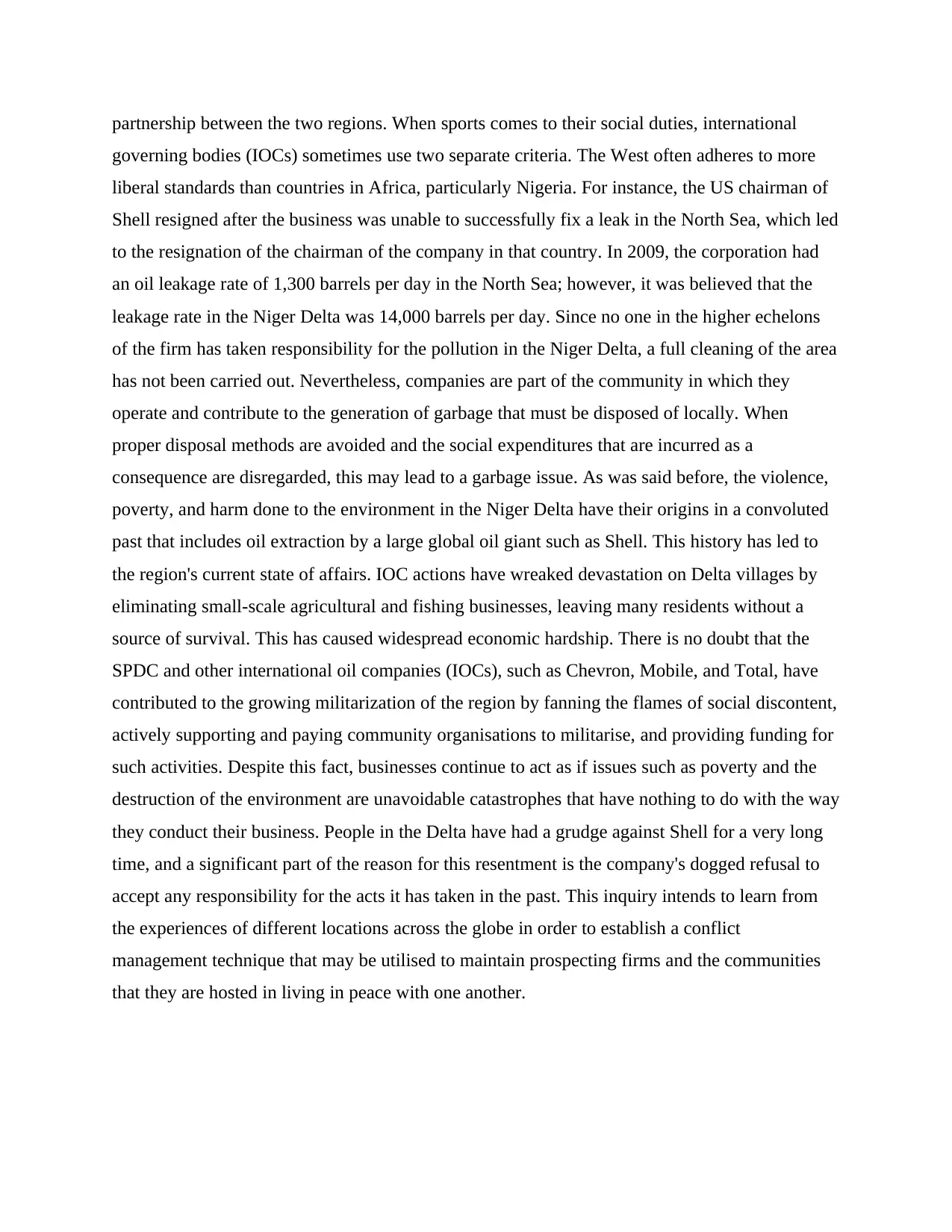
partnership between the two regions. When sports comes to their social duties, international
governing bodies (IOCs) sometimes use two separate criteria. The West often adheres to more
liberal standards than countries in Africa, particularly Nigeria. For instance, the US chairman of
Shell resigned after the business was unable to successfully fix a leak in the North Sea, which led
to the resignation of the chairman of the company in that country. In 2009, the corporation had
an oil leakage rate of 1,300 barrels per day in the North Sea; however, it was believed that the
leakage rate in the Niger Delta was 14,000 barrels per day. Since no one in the higher echelons
of the firm has taken responsibility for the pollution in the Niger Delta, a full cleaning of the area
has not been carried out. Nevertheless, companies are part of the community in which they
operate and contribute to the generation of garbage that must be disposed of locally. When
proper disposal methods are avoided and the social expenditures that are incurred as a
consequence are disregarded, this may lead to a garbage issue. As was said before, the violence,
poverty, and harm done to the environment in the Niger Delta have their origins in a convoluted
past that includes oil extraction by a large global oil giant such as Shell. This history has led to
the region's current state of affairs. IOC actions have wreaked devastation on Delta villages by
eliminating small-scale agricultural and fishing businesses, leaving many residents without a
source of survival. This has caused widespread economic hardship. There is no doubt that the
SPDC and other international oil companies (IOCs), such as Chevron, Mobile, and Total, have
contributed to the growing militarization of the region by fanning the flames of social discontent,
actively supporting and paying community organisations to militarise, and providing funding for
such activities. Despite this fact, businesses continue to act as if issues such as poverty and the
destruction of the environment are unavoidable catastrophes that have nothing to do with the way
they conduct their business. People in the Delta have had a grudge against Shell for a very long
time, and a significant part of the reason for this resentment is the company's dogged refusal to
accept any responsibility for the acts it has taken in the past. This inquiry intends to learn from
the experiences of different locations across the globe in order to establish a conflict
management technique that may be utilised to maintain prospecting firms and the communities
that they are hosted in living in peace with one another.
governing bodies (IOCs) sometimes use two separate criteria. The West often adheres to more
liberal standards than countries in Africa, particularly Nigeria. For instance, the US chairman of
Shell resigned after the business was unable to successfully fix a leak in the North Sea, which led
to the resignation of the chairman of the company in that country. In 2009, the corporation had
an oil leakage rate of 1,300 barrels per day in the North Sea; however, it was believed that the
leakage rate in the Niger Delta was 14,000 barrels per day. Since no one in the higher echelons
of the firm has taken responsibility for the pollution in the Niger Delta, a full cleaning of the area
has not been carried out. Nevertheless, companies are part of the community in which they
operate and contribute to the generation of garbage that must be disposed of locally. When
proper disposal methods are avoided and the social expenditures that are incurred as a
consequence are disregarded, this may lead to a garbage issue. As was said before, the violence,
poverty, and harm done to the environment in the Niger Delta have their origins in a convoluted
past that includes oil extraction by a large global oil giant such as Shell. This history has led to
the region's current state of affairs. IOC actions have wreaked devastation on Delta villages by
eliminating small-scale agricultural and fishing businesses, leaving many residents without a
source of survival. This has caused widespread economic hardship. There is no doubt that the
SPDC and other international oil companies (IOCs), such as Chevron, Mobile, and Total, have
contributed to the growing militarization of the region by fanning the flames of social discontent,
actively supporting and paying community organisations to militarise, and providing funding for
such activities. Despite this fact, businesses continue to act as if issues such as poverty and the
destruction of the environment are unavoidable catastrophes that have nothing to do with the way
they conduct their business. People in the Delta have had a grudge against Shell for a very long
time, and a significant part of the reason for this resentment is the company's dogged refusal to
accept any responsibility for the acts it has taken in the past. This inquiry intends to learn from
the experiences of different locations across the globe in order to establish a conflict
management technique that may be utilised to maintain prospecting firms and the communities
that they are hosted in living in peace with one another.
Paraphrase This Document
Need a fresh take? Get an instant paraphrase of this document with our AI Paraphraser
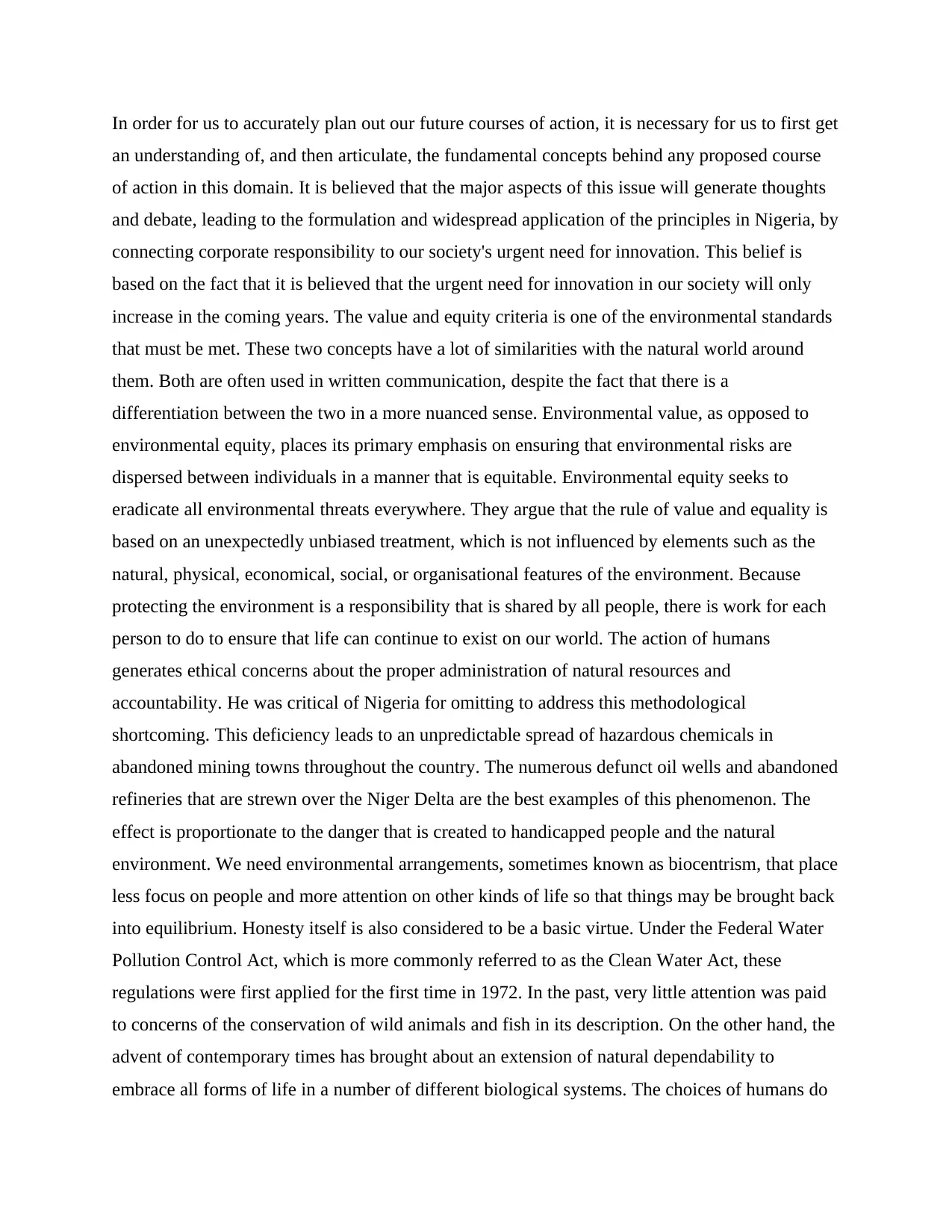
In order for us to accurately plan out our future courses of action, it is necessary for us to first get
an understanding of, and then articulate, the fundamental concepts behind any proposed course
of action in this domain. It is believed that the major aspects of this issue will generate thoughts
and debate, leading to the formulation and widespread application of the principles in Nigeria, by
connecting corporate responsibility to our society's urgent need for innovation. This belief is
based on the fact that it is believed that the urgent need for innovation in our society will only
increase in the coming years. The value and equity criteria is one of the environmental standards
that must be met. These two concepts have a lot of similarities with the natural world around
them. Both are often used in written communication, despite the fact that there is a
differentiation between the two in a more nuanced sense. Environmental value, as opposed to
environmental equity, places its primary emphasis on ensuring that environmental risks are
dispersed between individuals in a manner that is equitable. Environmental equity seeks to
eradicate all environmental threats everywhere. They argue that the rule of value and equality is
based on an unexpectedly unbiased treatment, which is not influenced by elements such as the
natural, physical, economical, social, or organisational features of the environment. Because
protecting the environment is a responsibility that is shared by all people, there is work for each
person to do to ensure that life can continue to exist on our world. The action of humans
generates ethical concerns about the proper administration of natural resources and
accountability. He was critical of Nigeria for omitting to address this methodological
shortcoming. This deficiency leads to an unpredictable spread of hazardous chemicals in
abandoned mining towns throughout the country. The numerous defunct oil wells and abandoned
refineries that are strewn over the Niger Delta are the best examples of this phenomenon. The
effect is proportionate to the danger that is created to handicapped people and the natural
environment. We need environmental arrangements, sometimes known as biocentrism, that place
less focus on people and more attention on other kinds of life so that things may be brought back
into equilibrium. Honesty itself is also considered to be a basic virtue. Under the Federal Water
Pollution Control Act, which is more commonly referred to as the Clean Water Act, these
regulations were first applied for the first time in 1972. In the past, very little attention was paid
to concerns of the conservation of wild animals and fish in its description. On the other hand, the
advent of contemporary times has brought about an extension of natural dependability to
embrace all forms of life in a number of different biological systems. The choices of humans do
an understanding of, and then articulate, the fundamental concepts behind any proposed course
of action in this domain. It is believed that the major aspects of this issue will generate thoughts
and debate, leading to the formulation and widespread application of the principles in Nigeria, by
connecting corporate responsibility to our society's urgent need for innovation. This belief is
based on the fact that it is believed that the urgent need for innovation in our society will only
increase in the coming years. The value and equity criteria is one of the environmental standards
that must be met. These two concepts have a lot of similarities with the natural world around
them. Both are often used in written communication, despite the fact that there is a
differentiation between the two in a more nuanced sense. Environmental value, as opposed to
environmental equity, places its primary emphasis on ensuring that environmental risks are
dispersed between individuals in a manner that is equitable. Environmental equity seeks to
eradicate all environmental threats everywhere. They argue that the rule of value and equality is
based on an unexpectedly unbiased treatment, which is not influenced by elements such as the
natural, physical, economical, social, or organisational features of the environment. Because
protecting the environment is a responsibility that is shared by all people, there is work for each
person to do to ensure that life can continue to exist on our world. The action of humans
generates ethical concerns about the proper administration of natural resources and
accountability. He was critical of Nigeria for omitting to address this methodological
shortcoming. This deficiency leads to an unpredictable spread of hazardous chemicals in
abandoned mining towns throughout the country. The numerous defunct oil wells and abandoned
refineries that are strewn over the Niger Delta are the best examples of this phenomenon. The
effect is proportionate to the danger that is created to handicapped people and the natural
environment. We need environmental arrangements, sometimes known as biocentrism, that place
less focus on people and more attention on other kinds of life so that things may be brought back
into equilibrium. Honesty itself is also considered to be a basic virtue. Under the Federal Water
Pollution Control Act, which is more commonly referred to as the Clean Water Act, these
regulations were first applied for the first time in 1972. In the past, very little attention was paid
to concerns of the conservation of wild animals and fish in its description. On the other hand, the
advent of contemporary times has brought about an extension of natural dependability to
embrace all forms of life in a number of different biological systems. The choices of humans do
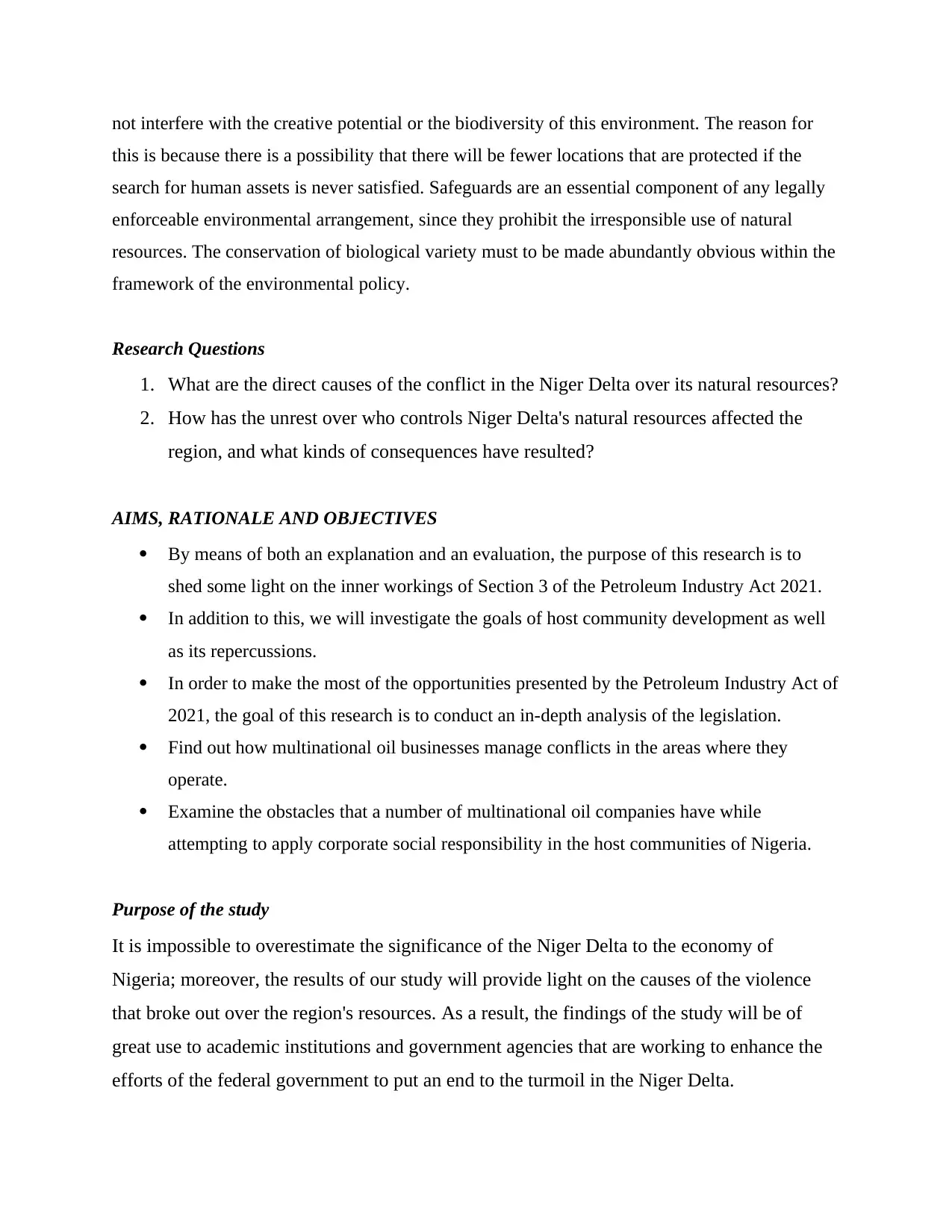
not interfere with the creative potential or the biodiversity of this environment. The reason for
this is because there is a possibility that there will be fewer locations that are protected if the
search for human assets is never satisfied. Safeguards are an essential component of any legally
enforceable environmental arrangement, since they prohibit the irresponsible use of natural
resources. The conservation of biological variety must to be made abundantly obvious within the
framework of the environmental policy.
Research Questions
1. What are the direct causes of the conflict in the Niger Delta over its natural resources?
2. How has the unrest over who controls Niger Delta's natural resources affected the
region, and what kinds of consequences have resulted?
AIMS, RATIONALE AND OBJECTIVES
By means of both an explanation and an evaluation, the purpose of this research is to
shed some light on the inner workings of Section 3 of the Petroleum Industry Act 2021.
In addition to this, we will investigate the goals of host community development as well
as its repercussions.
In order to make the most of the opportunities presented by the Petroleum Industry Act of
2021, the goal of this research is to conduct an in-depth analysis of the legislation.
Find out how multinational oil businesses manage conflicts in the areas where they
operate.
Examine the obstacles that a number of multinational oil companies have while
attempting to apply corporate social responsibility in the host communities of Nigeria.
Purpose of the study
It is impossible to overestimate the significance of the Niger Delta to the economy of
Nigeria; moreover, the results of our study will provide light on the causes of the violence
that broke out over the region's resources. As a result, the findings of the study will be of
great use to academic institutions and government agencies that are working to enhance the
efforts of the federal government to put an end to the turmoil in the Niger Delta.
this is because there is a possibility that there will be fewer locations that are protected if the
search for human assets is never satisfied. Safeguards are an essential component of any legally
enforceable environmental arrangement, since they prohibit the irresponsible use of natural
resources. The conservation of biological variety must to be made abundantly obvious within the
framework of the environmental policy.
Research Questions
1. What are the direct causes of the conflict in the Niger Delta over its natural resources?
2. How has the unrest over who controls Niger Delta's natural resources affected the
region, and what kinds of consequences have resulted?
AIMS, RATIONALE AND OBJECTIVES
By means of both an explanation and an evaluation, the purpose of this research is to
shed some light on the inner workings of Section 3 of the Petroleum Industry Act 2021.
In addition to this, we will investigate the goals of host community development as well
as its repercussions.
In order to make the most of the opportunities presented by the Petroleum Industry Act of
2021, the goal of this research is to conduct an in-depth analysis of the legislation.
Find out how multinational oil businesses manage conflicts in the areas where they
operate.
Examine the obstacles that a number of multinational oil companies have while
attempting to apply corporate social responsibility in the host communities of Nigeria.
Purpose of the study
It is impossible to overestimate the significance of the Niger Delta to the economy of
Nigeria; moreover, the results of our study will provide light on the causes of the violence
that broke out over the region's resources. As a result, the findings of the study will be of
great use to academic institutions and government agencies that are working to enhance the
efforts of the federal government to put an end to the turmoil in the Niger Delta.
⊘ This is a preview!⊘
Do you want full access?
Subscribe today to unlock all pages.

Trusted by 1+ million students worldwide
1 out of 9
Related Documents
Your All-in-One AI-Powered Toolkit for Academic Success.
+13062052269
info@desklib.com
Available 24*7 on WhatsApp / Email
![[object Object]](/_next/static/media/star-bottom.7253800d.svg)
Unlock your academic potential
Copyright © 2020–2026 A2Z Services. All Rights Reserved. Developed and managed by ZUCOL.



